You might be tempted to offer your cat a rawhide chew as a treat if they enjoy chewing on items.
Because they may help keep dogs’ teeth clean and satiate their natural chewing drive, rawhide chews are popular among dog owners.
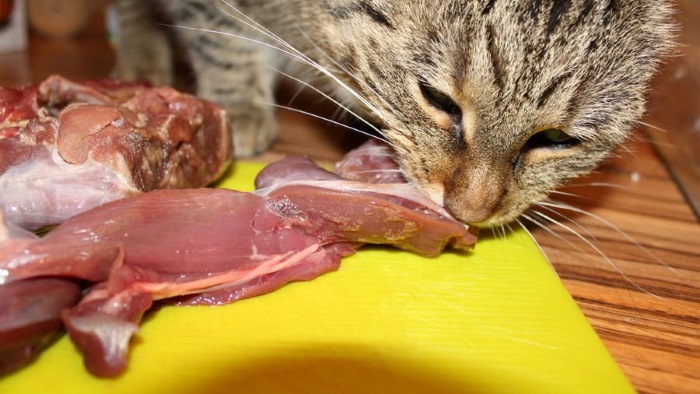
But are cat treats made of rawhide safe? Do cats even require them?
The benefits and drawbacks of rawhide cat chews will be discussed in this article, along with other better options for your feline buddy.
What is Rawhide?
Rawhide is the inner layer of animal skin that has been treated to make it strong and chewable. It often comes from cows or horses.
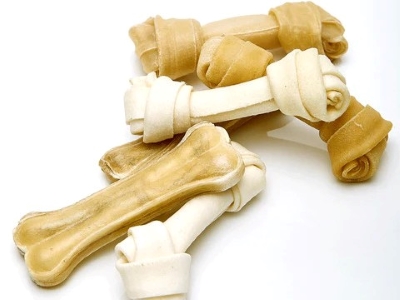
In the processing, the skin is stripped of its hair, fat, and flesh before being bleached to eliminate stains and smells, preserved in chemicals to prevent decomposition, and shaped into different shapes like bones, sticks, or twists.
Since rawhide lacks any nutritional value and is not subject to any food safety regulations, it is not regarded as food.
Why Do Some Cats Like Rawhide?
Some cats could take pleasure in chewing on rawhide since it offers them certain advantages, like:
- Dental health
Chewing on rawhide can help scrape off plaque and tartar from your cat’s teeth, preventing dental problems[1] such as gingivitis and periodontitis.
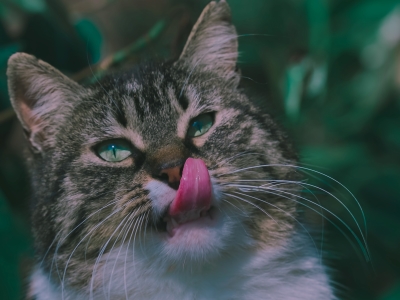
- Mental stimulation
Chewing on rawhide can keep your cat entertained and occupied, reducing boredom and stress[2].
- Instinctual behavior
Chewing on rawhide can satisfy your cat’s natural instinct to hunt and kill prey, as they would do in the wild.
What are the Risks of Rawhide for Cats?
Despite these benefits, rawhide also poses some serious risks for cats, such as:
Choking hazard
Rawhide can become soft and sticky when wet, making it easy for your cat to bite off large pieces and swallow them.
These pieces can get stuck in your cat’s throat or esophagus, blocking their airway and causing choking[3].
Digestive obstruction
Cats lack the enzymes to break down rawhide; therefore, they cannot readily digest it.
The accumulation of rawhide in your cat’s stomach or intestines might result in a blockage that prevents the passage of food and water.
Vomiting, diarrhea, dehydration, appetite loss, weight loss, stomach discomfort, and even death can result from this.
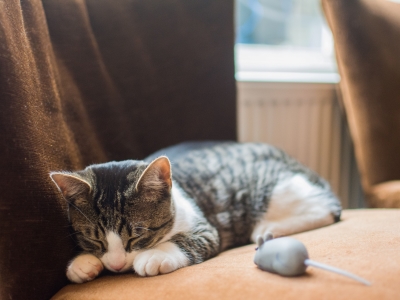
Medical director and founder of Just Cats Clinic, Dr. Elizabeth Arguelles states on PetMD “A cat that is vomiting more than once per month should be examined by a veterinarian, who will deworm—or recommend your cat be on monthly prevention with Revolution, Advantage Multi or Heartgard“
Toxicity
Rawhide can contain harmful chemicals that are used during processing, such as arsenic, lead, mercury, formaldehyde, and chromium.
These chemicals can leach into your cat’s system when they chew on rawhide, causing poisoning symptoms such as drooling, tremors, seizures, coma, and death.
Rawhide can also be contaminated with bacteria such as salmonella or E. coli, which can cause infections in your cat or even in you if you handle the rawhide or touch your cat’s mouth.
How to Prevent Your Cat from Eating Rawhide
Keeping your cat away from your dog may be a good idea if your dog likes to chew on rawhide. To stop your cat from consuming rawhide, use these suggestions:
- Store rawhide chews in a secure place: Keep rawhide chews in a closed container or cabinet that your cat cannot access. Do not leave them lying around the house or within your cat’s reach.
- Supervise your dog when they chew on rawhide: Do not leave your dog alone with a rawhide chew. Watch them closely and make sure they do not break off large pieces or swallow them whole.
If they do, remove the rawhide from their mouth immediately and check for signs of choking or obstruction.
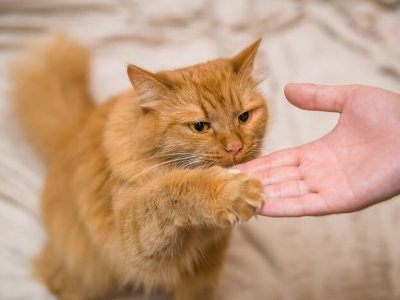
- Discard old or damaged rawhide chews: Old, moldy, cracked, or broken rawhide should not be given to your dog to chew on.
These can put your dog or cat at increased risk of choking or illness.
- Provide alternative chews for your cat: Instead of giving your cat rawhide chews, offer them safer and more suitable options that are designed for cats. These include:
1) Catnip toys: Catnip is an herb that stimulates most cats and makes them playful and happy.
You can find various toys that are filled with catnip or sprayed with catnip oil that your cat can chew on and enjoy.
2) Dental treats: Dental treats are specially formulated to clean your cat’s teeth and freshen their breath.
They come in different shapes, sizes, flavors, and textures that appeal to your cat’s taste buds and chewing preferences.
3)Silver vine sticks: Silver vine is another herb that has a similar effect to catnip on most cats. It can make your cat more active, relaxed, and affectionate.
Silver vine sticks are natural and organic products that your cat can chew on.
4)Freeze-dried meat: Your cat will adore the high–protein, low–carb snack of freeze–dried beef. It is produced from freeze–dried actual beef that has been preserved in flavor and nutritional value.
Your cat may enjoy chewing on and savoring freeze–dried meat in a variety of shapes, including cubes, strips, and nuggets.
FAQs
What are obligate carnivores, and how do they relate to cats?
Obligate carnivores are animals that require a diet primarily composed of animal-based proteins. Cats fall into this category, meaning their bodies are optimized for processing meat rather than plant materials like rawhide.
Are there alternatives to rawhide treats for cats?
Absolutely. Opt for cat-friendly chews made from safe and digestible materials. Interactive toys, dental treats, and specially formulated cat treats are also great alternatives to rawhide.
Can kittens have rawhide treats?
Kittens’ digestive systems are even more delicate than adult cats, making rawhide treats an even riskier choice. Stick to specially formulated kitten treats and toys.
Can senior cats safely consume rawhide?
Senior cats may have even more sensitive digestive systems, making rawhide an even riskier choice. It’s best to focus on treats and toys tailored to their age and needs.
Are there any specific health conditions that make rawhide even riskier for cats?
Cats with dental issues, gastrointestinal sensitivities, or a history of choking are at an even higher risk when it comes to rawhide consumption.
Conclusion
Since rawhide chews can result in choking, intestinal blockage, toxicity, and infection, cats should not consume them.
Since they acquire their nutrition from meat and other sources, cats don’t need to consume rawhide chews.
If your cat enjoys chewing on objects, give them safe, acceptable alternatives to chew on, including catnip toys, dental treats, silver vine sticks, or freeze-dried meat.
You can keep your cat content, happy, and healthy by doing this.
Reference:
- Dental Disease in Cats | International Cat Care
- Mental stimulation for cats | Bypath Human Society
- Pet choking! Here’s what to do | PD Insurance

Dave is our best team member when it comes to taking care of pets on daily basis. This is because he used to be a full-time pet sitter before joining CatLikesBest. Besides contributing his precious knowledge on cat care tips and everyday-use pet products, he still does pet sitting as part of his hobby in his free time.

